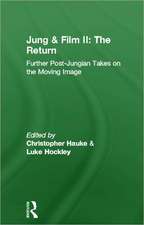New Directions in German Cinema: World Cinema
Editat de Paul Cooke, Chris Homewooden Limba Engleză Hardback – 28 sep 2011
| Toate formatele și edițiile | Preț | Express |
|---|---|---|
| Paperback (1) | 169.20 lei 6-8 săpt. | |
| Bloomsbury Publishing – 28 sep 2011 | 169.20 lei 6-8 săpt. | |
| Hardback (1) | 775.79 lei 3-5 săpt. | |
| Bloomsbury Publishing – 28 sep 2011 | 775.79 lei 3-5 săpt. |
Din seria World Cinema
- 13%
 Preț: 176.27 lei
Preț: 176.27 lei - 30%
 Preț: 571.96 lei
Preț: 571.96 lei - 30%
 Preț: 539.18 lei
Preț: 539.18 lei - 23%
 Preț: 193.87 lei
Preț: 193.87 lei - 30%
 Preț: 714.51 lei
Preț: 714.51 lei - 21%
 Preț: 219.09 lei
Preț: 219.09 lei - 30%
 Preț: 541.85 lei
Preț: 541.85 lei - 30%
 Preț: 513.71 lei
Preț: 513.71 lei - 19%
 Preț: 470.32 lei
Preț: 470.32 lei - 30%
 Preț: 543.51 lei
Preț: 543.51 lei - 20%
 Preț: 219.19 lei
Preț: 219.19 lei - 30%
 Preț: 539.18 lei
Preț: 539.18 lei - 30%
 Preț: 714.12 lei
Preț: 714.12 lei - 22%
 Preț: 227.88 lei
Preț: 227.88 lei - 30%
 Preț: 511.40 lei
Preț: 511.40 lei - 30%
 Preț: 716.56 lei
Preț: 716.56 lei - 13%
 Preț: 166.36 lei
Preț: 166.36 lei - 23%
 Preț: 191.92 lei
Preț: 191.92 lei - 30%
 Preț: 774.64 lei
Preț: 774.64 lei - 24%
 Preț: 189.92 lei
Preț: 189.92 lei - 9%
 Preț: 169.83 lei
Preț: 169.83 lei -
 Preț: 166.82 lei
Preț: 166.82 lei - 18%
 Preț: 167.24 lei
Preț: 167.24 lei - 14%
 Preț: 165.66 lei
Preț: 165.66 lei - 23%
 Preț: 194.41 lei
Preț: 194.41 lei - 23%
 Preț: 197.68 lei
Preț: 197.68 lei - 23%
 Preț: 198.40 lei
Preț: 198.40 lei - 18%
 Preț: 161.04 lei
Preț: 161.04 lei - 18%
 Preț: 154.50 lei
Preț: 154.50 lei - 21%
 Preț: 217.17 lei
Preț: 217.17 lei - 30%
 Preț: 716.17 lei
Preț: 716.17 lei - 21%
 Preț: 218.54 lei
Preț: 218.54 lei - 26%
 Preț: 597.22 lei
Preț: 597.22 lei - 25%
 Preț: 772.98 lei
Preț: 772.98 lei
Preț: 775.79 lei
Preț vechi: 916.25 lei
-15% Nou
Puncte Express: 1164
Preț estimativ în valută:
148.44€ • 155.41$ • 122.83£
148.44€ • 155.41$ • 122.83£
Carte disponibilă
Livrare economică 15-29 martie
Preluare comenzi: 021 569.72.76
Specificații
ISBN-13: 9781848859081
ISBN-10: 1848859082
Pagini: 320
Ilustrații: 28 integrated bw
Dimensiuni: 156 x 234 x 30 mm
Greutate: 0.63 kg
Editura: Bloomsbury Publishing
Colecția I.B.Tauris
Seria World Cinema
Locul publicării:London, United Kingdom
ISBN-10: 1848859082
Pagini: 320
Ilustrații: 28 integrated bw
Dimensiuni: 156 x 234 x 30 mm
Greutate: 0.63 kg
Editura: Bloomsbury Publishing
Colecția I.B.Tauris
Seria World Cinema
Locul publicării:London, United Kingdom
Notă biografică
Paul Cooke is Professor of German Cultural Studies at the University of Leeds. Chris Homewood is Lecturer in German and World Cinema at the University of Leeds.
Cuprins
IntroductionBeyond the Cinema of Consensus? New Directions in German Cinema since 2000Paul Cooke and Chris Homewood Chapter One 'A Kind of Species Memory': The Time of the Elephants in the Space of Alexander Kluge's Cinematic PrincipleJohn E. DavidsChapter TwoDownfall (2004): Hitler in the New Millennium and the (Ab)Uses of HistoryChristine HaaseChapter Three'Wonderfully Courageous'?: The Human Face of a Legend in Sophie Sophie Scholl: The Final Days (2005)Owen EvansChapter Four Music After Mauthausen: Re-Presenting the Holocaust in Stefan Ruzowitzky's The Counterfeiters (2007)Brad PragerChapter FiveAiming to Please? Consensus and consciousness-raising in Wolfgang Becker's Good Bye, Lenin! (2003)Nick HodginChapter SixWatching the Stasi: Authenticity, Ostalgie and History in Florian Henckel von Donnersmarck's The Lives of Others (2006)Paul CookeChapter Seven From Baader to Prada: Memory and Myth in Uli Edel's The Baader Meinhof Complex (2008)Chris HomewoodChapter EightThe Absent Heimat: Hans-Christian Schmid's Requiem (2006)David ClarkeChapter NinePlay for Today: Situationist Protests and Uncanny Encounters in Hans Weingartner's The Edukators (2004)Rachel PalfreymanChapter TenGerman Autoren Dialogue with Hollywood? Refunctioning the Horror Genre in Christian Petzold's Yella (2007)Jaimey FisherChapter Eleven'A Sharpening of Our Regard': Realism, Affect, and the Redistribution of the Sensible in Valeska Grisebach's Longing (2006)Marco AbelChapter TwelveToo Late for Love? The Cinema of Andreas Dresen on Cloud 9 (2008)Laura G. McGeeChapter Thirteen 'Seeing Everything with Different Eyes': The Diasporic Optic of Fatih Akin's Head On (2004)Daniela BerghahnChapter FourteenNo Place Like Heimat: Mediaspaces and moving landscapes in Edgar Reitz's Heimat 3 (2004)Alasdair KingReferences























